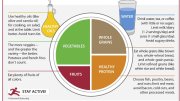Red-meat consumption is already linked to higher levels of colorectal cancer and cardiovascular disease (atherosclerosis, heart disease, and stroke). Now researchers from Harvard School of Public Health (HSPH) have added an increased risk of type 2 (adult onset) diabetes to that list. The incurable illness occurs when the body’s ability to control blood glucose levels by means of insulin secretion becomes impaired, either because of “insulin resistance” (when insulin fails to trigger effective glucose uptake by muscle or other tissues), or because production of insulin by beta cells in the pancreas declines.
The HSPH investigators, led by professor of epidemiology Frank Hu and research fellow An Pan, analyzed data from three longitudinal studies of male and female healthcare professionals who were followed for 14 to 28 years. After adjusting for other risk factors, the researchers found that a daily serving of red meat no larger than a deck of cards increased the risk of adult-onset diabetes by 19 percent. Processed red meat proved much worse: a daily serving half that size—one hot dog, or two slices of bacon, for example—was associated with a 51 percent increase in risk. (The average 10-year risk of getting diabetes for U.S. adults is around 10 percent.)
Why is red meat harmful? “Saturated fat, which can lead to cardiovascular disease, is really just the beginning of the story,” explains Hu. Even though it is “difficult to pinpoint one compound or ingredient” as mechanistically linked to diabetes risk, three components of red meat—sodium, nitrites, and iron—are probably involved. Sodium is well known to increase blood pressure, but it also causes insulin resistance; nitrites and nitrates have also been shown to increase insulin resistance and to impair the function of the pancreatic beta cells. Iron, although an essential mineral, can cause beta-cell damage in individuals with hereditary hemochromatosis (a disorder in which the gastrointestinal tract absorbs too much iron), and heme iron—the readily absorbable type found in meat—at high levels can lead to oxidative stress (and cell damage) and systemic, chronic inflammation in some people.
The study found that substituting other foods—such as whole grains, nuts, low-fat dairy, fish, and poultry (listed in order of effectiveness)—for meat substantially lowered diabetes risk. (Beans were not part of the study because consumption levels are so low, but Hu says that the benefits would likely be similar to consumption of other plant-based foods.) The findings of the group, which included Stare professor of nutrition Walter Willett and Brigham professor of women’s health JoAnn Manson, agree with the advice presented in a “Healthy Eating Plate” (HSPH’s answer to the U.S. government’s MyPlate dietary guidance), on which meat and dairy products are not even represented visually. The Healthy Eating Plate emphasizes vegetables, fruits, whole grains, and healthy proteins such as those listed in Hu’s study; recommends avoiding processed meats entirely; and shows a glass of water, rather than a glass of milk, beside the plate. “We don’t need to remove red meat from the diet entirely,” says Hu. “Americans just need to move meat from the center of the plate to the side of the plate.”










